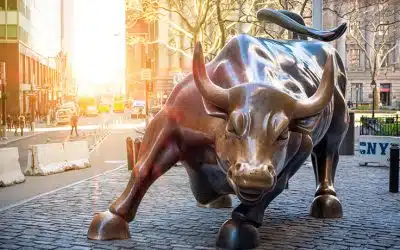“We’re going to keep investing very selectively in alternatives in this new rate scenario”

Redacción Mapfre
In the section "MAPFRE AM's interview of the month", we talked to Conchi Bravo, head of alternative investments at MAPFRE AM.
The Group increased its commitment to private debt and equity in 2017. As the expert says, and despite the fact that the rate environment has changed, the advantages of having exposure to these assets are increasingly attractive: diversification with respect to the rest of the portfolio, low correlation with market movements, so that it helps you reduce volatility, and access to opportunities not available in liquid markets.
Can you tell us a little about your professional career and, specifically, about your career at MAPFRE?
I joined MAPFRE AM in March 2017 as a fixed-income portfolio manager. I got my degree in Economics from the Carlos III University of Madrid, and I also have two Masters’ degrees, one in Quantitative Finance and the other in Risk Management in Insurance products. I also obtained the EFFAS Certified ESG Analyst certification.
I started out at Caja Madrid as a fixed income manager. From there I moved to BBVA, where I stayed for 15 years, working first as a volatility trader in FX derivatives and later, I was on the SME Risk team with Commodities products. Since March 2022, I’ve been responsible for the Alternative Investment, Private Debt and Equity team at MAPFRE AM.
You’re responsible for alternative assets at MAPFRE AM. Do you think this type of management entails specific specialization or training? How are decisions made?
It’s a complex product, given the details involved and the depths you need to plumb. It requires a lot of learning because it’s not a standard asset class. Each fund manager has individual characteristics. And we’re dealing with a lot of non-public information that is difficult to get hold of, so alternatives managers need to be continuously trained.
Before making a decision, we do a lot of DD (Due Diligence, in-depth research on the possible investment or strategy), which can take months to complete. We’ve designed our own questionnaire at MAPFRE that allows us to compare the different strategies. Once the proposal has been completed and we find it appealing, we share it with the risk, legal, tax, FATCA departments, because we need them all to sign off on it before investing.
It's clear that the track record of the management team is key when looking at this type of asset, but it’s not the only one. The success of the funds from previous years, depending on the cycle, is very significant, as is the alignment of interests between the fund manager and the investors. If the fund management team co-invests with the investor, it gives us an idea of the managers' level of confidence in the investment strategy and policy.
Management must be clear, there must be geographically distributed branches (legislation and other aspects differ from country to country, so you need a specialized team) and it’s also important to know about where the company is domiciled and decision-making processes employed. On top of that, you have reporting and monitoring of positions.
This questionnaire we use isn’t static; it’s periodically modified to reflect the circumstances and market cycle. For example, given that it is a key aspect of how MAPFRE operates, we request that ESG criteria are taken into account when making investment decisions.
The alternative assets class is very broad. At MAPFRE, we’re seeing investments in debt, equity, infrastructure and real estate. What is the current debt and equity situation at MAPFRE?
The range is very wide and the underlying assets can vary greatly. The main difference with the market that we consider traditional is asset illiquidity. These types of investments are customized products, which means that the management team is vitally important. Given the current cycle, the following can clearly benefit: volatility, rates, inflation and situations of market dislocation.
In private debt, we see attractive levels of financing. In general, these investments are floating and offer us natural protection against rising rates. The cycle is attractive, given the price of debt, and the companies' balance sheets go hand in hand with very low leverage levels compared to previous cycles.
In my opinion, it’s one of the most complex underlying assets since it allows us to position ourselves in different strategies through the priority that exists in debt, taking into account the risk that we’re willing to take on, the subordination that we consider from senior debt, through unitranche to get to mezzanine. It will depend on how ambitious we are in terms of profitability and being clear about the risks we assume, not only in the product itself, but in terms of the aggregate of our portfolio. The current portfolio is a fund of funds only for MAPFRE companies (MAPFRE Private Debt, FIL), which is diversified in all the previous points.
Equities have a longer history than debt and that means access is more complicated. When we started investing, we realized that it was difficult to reach large and relevant fund managers and, in this case, we chose to go with Altamar. We’ve launched a very interesting fund of funds, MAPFRE PRIVATE Equity I, a fund diversified in terms of strategy, duration, managers, sectors, etc. But I think what’s interesting is that it’s an evergreen fund, there’s no maturity, so when we reach the target size, it will be self-financing without having to make capital calls on MAPFRE companies.
At MAPFRE, what strategy do we apply with this type of asset?
When we started investing in private debt and equity, in 2017, we were looking for additional profitability on top of what was offered by closed assets, given the circumstances at that time with negative interest rates. However, as we’ve progressed, the advantages of having exposure to these assets are becoming increasingly attractive to us: diversification compared to the rest of the portfolio, low correlation with market movements, in such a way that it helps you reduce volatility, access to opportunities that aren’t available in the liquid markets and that sort of thing. We clearly see the need to maintain this exposure to alternative assets, always being very selective when investing.
In a context of interest rate hikes, as we’re seeing now, how do these types of assets behave? And within the range of assets - private equity and private debt – which ones best withstand this cycle change?
In my opinion, private debt offers the best behavior. Most loans are floating, so you can get better levels of profitability. Even so, it’s clear that rising debt can put the companies that are financed in difficulties. Therefore, one of the covenants we take into account when making an investment is leveraging them. In general, we’re looking for companies with low debt, so that, at times like these, they perform better.
By geography and sector, where do you think there are more investment opportunities? For example, it’s often said that Spain is attractive, but the product is missing.
In Spain, we started out from a banking culture that is very different from the rest of Europe. And this trend has changed a lot in recent years. We’ve seen the migration to where more traditional companies are seeking financing of a type of debt that until now was only limited to funds. In fact, it’s becoming a very attractive market to invest in.
We’re also dealing with a key issue in regulation, which, in turn, is generic throughout Europe. Many banks are being forced to sell assets or not provide services under the new regulations, given that the cost of capital that this type of investment entails doesn’t line up well with the return they’ll get.
Banks aren’t able to provide solutions to companies in the short term and on a customized basis. Now we can see more and more traditional companies seeking out financing of a type of debt that until now was limited only to financial institutions.
Large managers such as KKR, Blackstone, etc., who previously didn’t invest in Spain are keener to do so now, and consider it a market with very profitable opportunities.
As far as geography goes, we are strongly committed to global and European funds to achieve the desired diversification. In terms of sectors, we look for positions that we consider very defensive - healthcare, technology or industrial - because we feel they can do very well, given the cycle we’re in. We usually rule out anything that’s highly exposed to cyclical consumption.
In addition to being investors, MAPFRE is very active with the launch of alternative asset funds and also has the best international alliances to do so. Tell us a little about this in terms of assets.
MAPFRE understands that either you develop your own asset management capabilities, and this is impossible for all existing assets, even for a company the size of MAPFRE, or you look for specialized first-line fund managers in the asset class you’re interested in, or you partner up or co-invest. This year, we launched our first debt fund, the MAPFRE Private Debt, PIL, which aims to facilitate exposure to this asset for all MAPFRE companies. We developed it directly based on our experience in the world of fixed income. In the case of Equities, given the difficulties in access and the need to have minimum exposure quickly, we felt that the right thing to do was to go with a player with long experience in the asset, namely Altamar.
Specifically, the focus is increasingly on ESG investments. Does this also happen in the field of alternatives?
Alternative assets, especially in Europe, have taken the lead against ESG listed assets. Not only in the orientation of environmental changes, as we can find in infrastructure, but also in impact ones. To be able to consider an investment and start studying it, we need it to be Article 8 or 9 at a minimum. Investing in this type of asset locks you up for 10 years. If at the end of that, in addition to getting the desired profitability, there is no social impact or visible improvement in society, then that investment is a failure. And we at MAPFRE are committed to playing our part in this respect.
Fund managers in the alternative world are making a huge effort in adapting their investment plans. There are three fundamentals at work here that are here to stay, which we call the three Cs:
Conviction – this is what needs to be done to save the planet.
Coaction- the current regulation is what it is, and this will increase.
Convenience - clients will request these investments.
Hobbies: I love traveling with my family and scuba diving.
Favorite dish: It’s not really a dish, but I could happily live on gildas (a tapas snack of olives, salted anchovies and pickled chilli peppers) if it was healthy.
Favorite city/country: We’ve managed to visit a lot of places as a family, but I’ll stick with Madrid.
Favourite group/singer: Iron Maiden was my favorite group when I was a kid – I love Bruce Dickinson’s voice.



